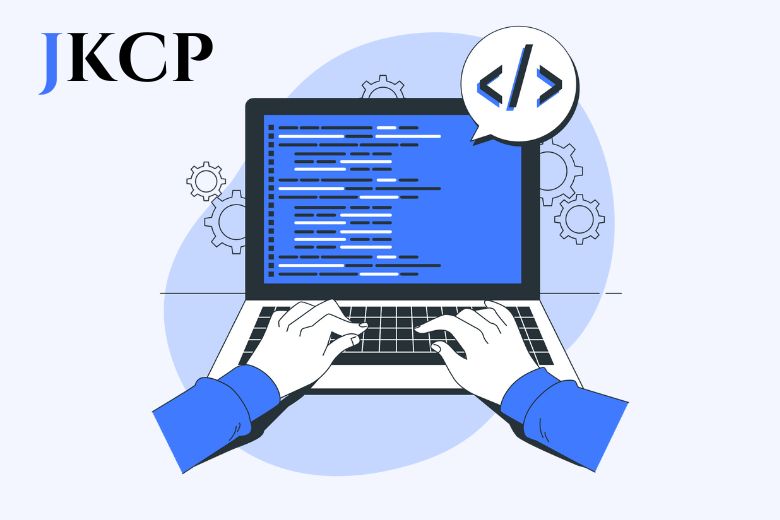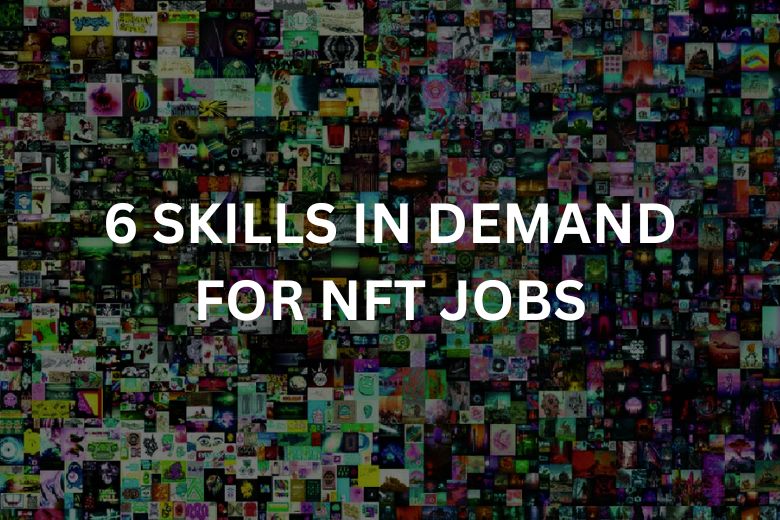Essential Technical Skills for a Career in Blockchain Security
Blockchain security is blowing up as one of the hottest and most vital tech fields. As blockchain networks power everything from decentralized finance (DeFi) to supply chain tracking, the need for experts to secure these systems is skyrocketing. If you’re considering a career in blockchain security, you need to build a solid technical foundation. Let’s explore the must-have skills, tools, and knowledge areas to succeed in this exciting field.
Why Blockchain Security Matters
Blockchain might seem inherently secure – it’s decentralized and tamper-resistant. But vulnerabilities still exist, whether it’s poorly written smart contracts, malicious nodes, or phishing attacks targeting users. The consequences of a breach can be devastating, with millions in assets stolen overnight, as seen in high-profile hacks like the DAO exploit and the Poly Network attack. This makes blockchain security a top company priority and a lucrative career path for skilled professionals.
Key Technical Skills for Blockchain Security
To thrive in blockchain security, you’ll need a mix of foundational knowledge and specialized expertise. Here’s what you should focus on:
1. Deep Understanding of Blockchain Architecture
Start with the basics: understand how blockchain works. This includes knowing the difference between public and private blockchains, how consensus mechanisms function, and how data is stored in a blockchain network.
Key concepts to master:
2. Smart Contract Development and Auditing
Smart contracts are self-executing agreements written in code. While powerful, they’re also a common source of vulnerabilities. Therefore, it’s essential to learn to develop and audit smart contracts.
- Programming Languages: Learn Solidity (for Ethereum), Vyper (alternative to Solidity), and Rust (for Solana and Polkadot).
- Audit Techniques: Identify common vulnerabilities like reentrancy attacks, integer overflows, and unchecked external calls.
Tools to use:
- Remix: For writing and testing Solidity contracts.
- Slither: A static analysis tool to find bugs in smart contracts.
- MythX: An automated security analysis tool for Ethereum smart contracts.
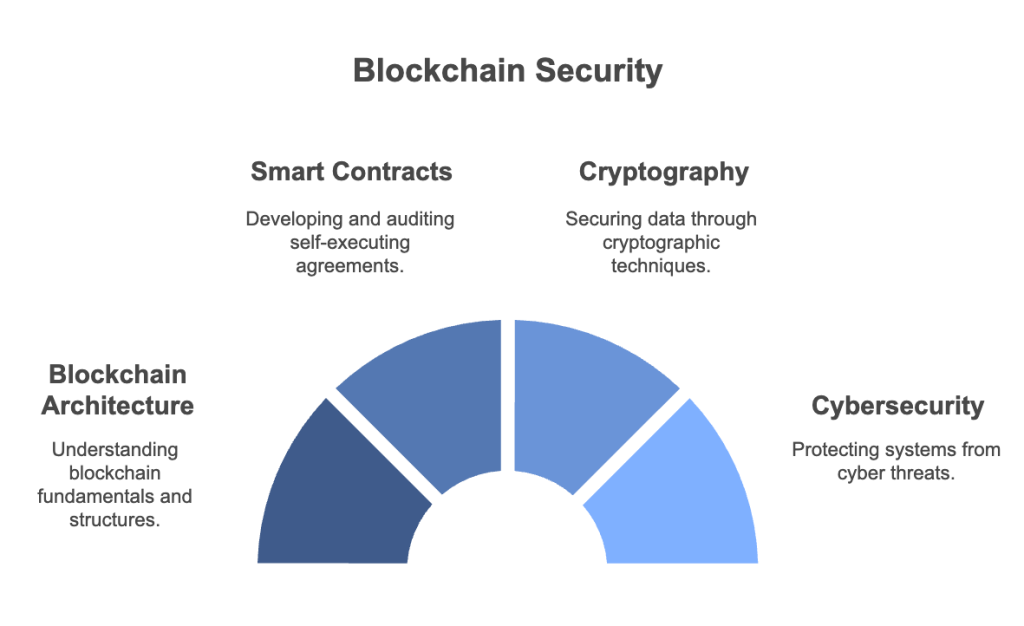
3. Cryptography Basics
Blockchain security relies heavily on cryptography. You don’t need to be a mathematician, but understanding how cryptographic techniques work is crucial.
Focus on:
4. Cybersecurity Fundamentals
Blockchain security is a subset of cybersecurity, so general knowledge of protecting systems from attacks is vital. Skills to build include:
- Network Security: Protecting blockchain nodes from Distributed Denial of Service (DDoS) attacks.
- Endpoint Security: Securing wallets and user interfaces from phishing or malware attacks.
- Incident Response: Developing a plan to address breaches or exploits quickly.
Essential Tools for Blockchain Security Experts
Every blockchain security professional should know how to use industry-standard tools. Here’s a quick list to get started:
1. Static and Dynamic Analysis Tools
- MythX: For automated Ethereum smart contract analysis.
- Echidna: A fuzzer to test smart contract behavior.
- Manticore: A symbolic execution tool for analyzing contracts.
2. Network Monitoring Tools
- Wireshark: For monitoring and analyzing network traffic.
- Zeek: To detect suspicious activity in blockchain nodes.
3. Block Explorers
- Etherscan: Analyze Ethereum transactions and smart contracts.
- Polkadot Explorer: For monitoring Polkadot networks.
4. Penetration Testing Tools
- Metasploit: For testing blockchain network vulnerabilities.
- Kali Linux: A security toolkit for penetration testing.
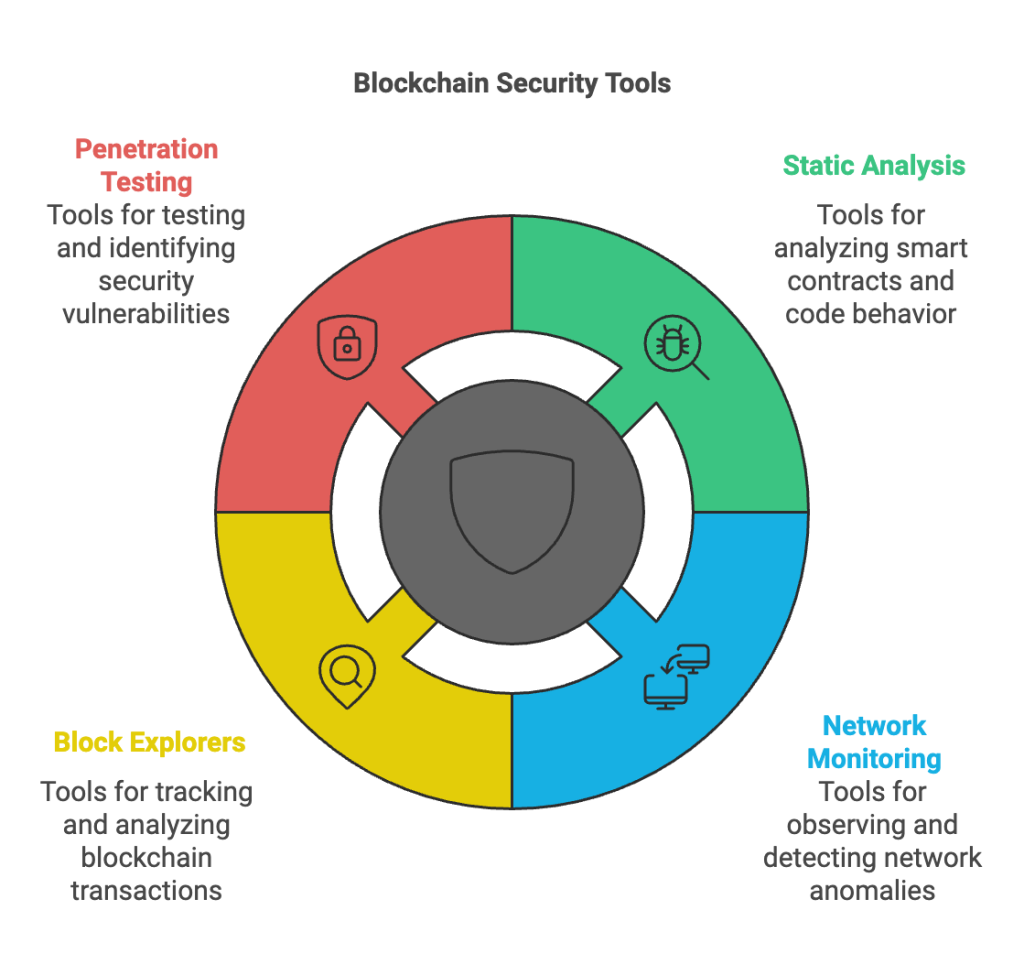
How to Get Started in Blockchain Security
Getting into blockchain security takes a mix of learning and real-world practice. Here’s how to jumpstart your journey:
1. Learn the Basics of Blockchain Technology
Start with beginner-friendly courses to understand blockchain fundamentals. Some great resources include:
2. Gain Hands-On Experience
Experiment with blockchain networks like Ethereum, Solana, or Binance Smart Chain. Deploy and test your own smart contracts on testnets like Rinkeby or Kovan.
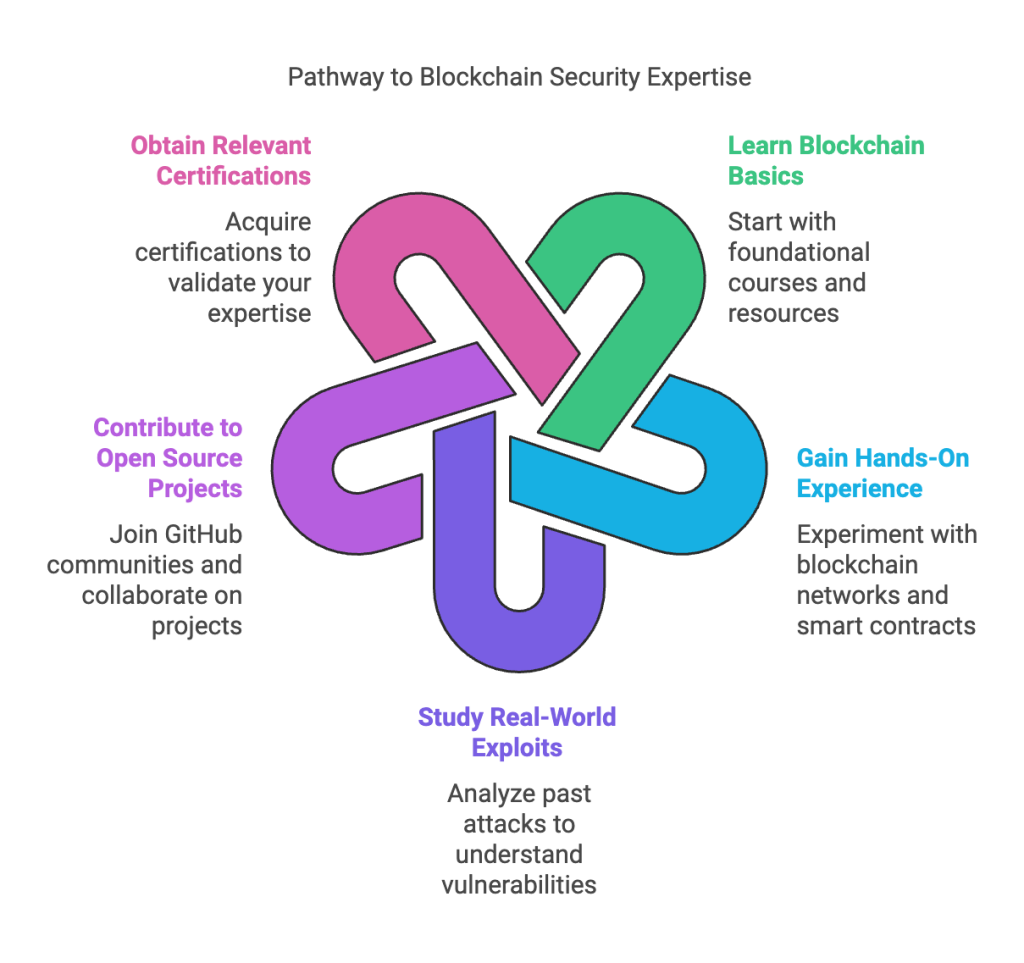
3. Study Real-World Exploits
One of the best ways to learn blockchain security is by studying past attacks. Dive into case studies like:
- The DAO Hack: A reentrancy attack drained $60M from an Ethereum-based project.
- The Ronin Bridge Hack: A $625M exploit targeting a sidechain of Axie Infinity.
4. Contribute to Open Source Projects
Join GitHub communities focused on blockchain security. Projects like OpenZeppelin offer learning opportunities from real-world code and collaborating with experts.
5. Obtain Relevant Certifications
Certifications demonstrate your expertise and commitment to the field. Consider:
- Certified Blockchain Security Professional (CBSP).
- Ethereum Developer Certification.
- Offensive Security Certified Professional (OSCP) for penetration testing.
Career Opportunities in Blockchain Security
As blockchain adoption grows, so do the opportunities for security professionals. Here are some popular roles:
1. Smart Contract Auditor
Auditors analyze smart contract code to find and fix vulnerabilities. Companies like Trail of Bits and OpenZeppelin regularly hire for these roles.
2. Blockchain Security Analyst
These professionals monitor blockchain networks for suspicious activity and implement security protocols. Tools like Chainalysis are often used for on-chain monitoring.
3. Penetration Tester
Pen testers simulate attacks on blockchain networks to find vulnerabilities before hackers do. This role often involves creating detailed reports and recommendations for improvement.
4. Security Architect
Architects design and implement secure blockchain systems, including developing best practices for key management, data encryption, and network resilience.
5. Incident Response Specialist
When something goes wrong – like a smart contract exploit or a phishing attack – incident response specialists step in to mitigate damage and recover assets.
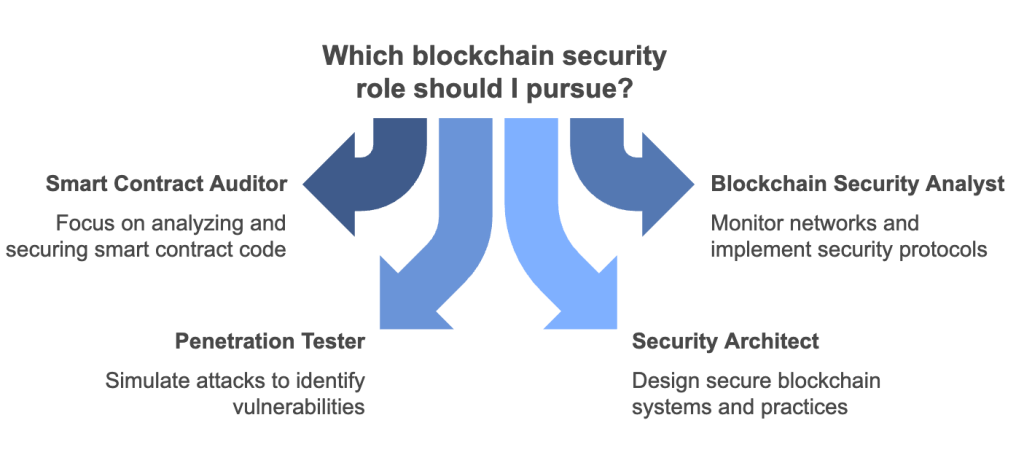
Emerging Trends in Blockchain Security
Blockchain security is constantly evolving. Stay ahead by keeping an eye on these trends:
1. Layer 2 Solutions
Scaling solutions like Optimistic Rollups and zk-Rollups introduce new attack vectors. Understanding these technologies will be crucial for future security experts.
2. Zero-Knowledge Proofs
ZKPs are becoming more common in blockchain applications, especially in privacy-focused projects. Learn how they work and how to secure them.
3. Quantum-Resistant Cryptography
As quantum computing advances, existing cryptographic methods could become obsolete. Blockchain security experts will play a key role in developing quantum-resistant solutions.
Conclusion
A career in blockchain security is challenging, rewarding, and constantly evolving. By mastering blockchain fundamentals, smart contract development, cryptography, and cybersecurity, you can position yourself as a vital player in protecting the future of decentralized technology. With the right skills, tools, and mindset, you’ll be ready to tackle the ever-changing landscape of blockchain security. Ready to dive in? The time to start is now.


